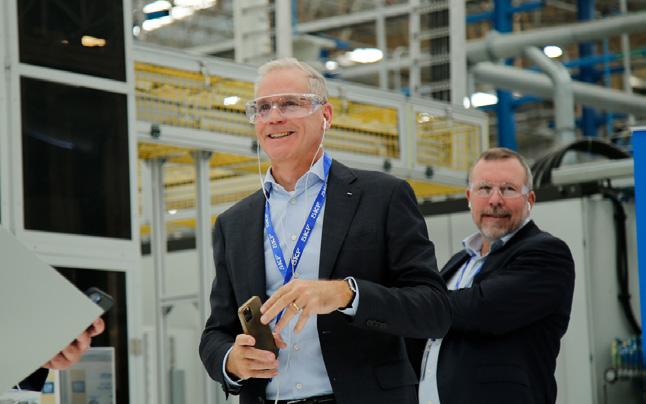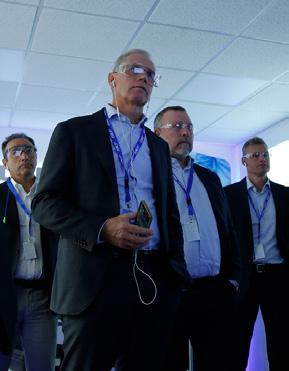COMPANY REPORT

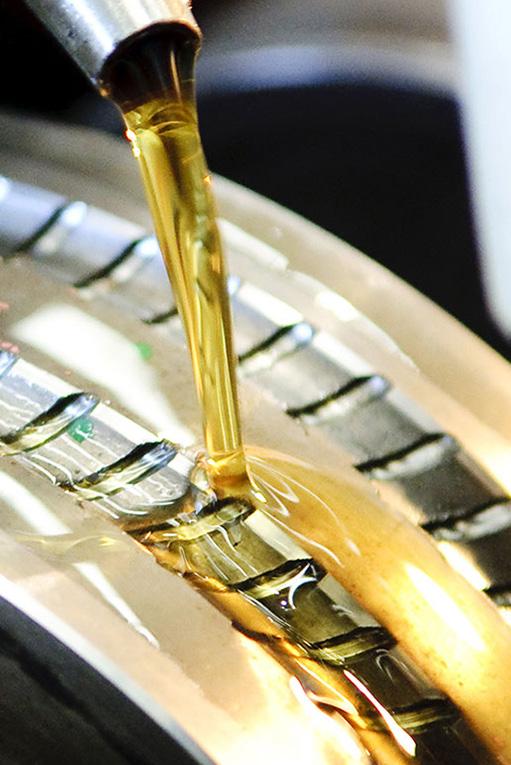




¿En qué consiste?
SKF supervisa el rendimiento de los equipos rotatorios en tiempo real 24/7:
Velocidad
Vibración
Lubricación
Temperatura
Carga
Mediante un Servicio de Diagnóstico Remoto de Monitoreo de condición y acceso a paneles de control.
El resultado obtenido es:
Disminución de riesgos de seguridad y salud en el trabajo – no requiere de excesivo personal presente en planta.
Aumento de la productividad / disponibilidad del equipo.
Mejora en la estrategia de mantenimiento y plan de acción de tipo predictivo.
Aumento en la velocidad de la detección de posibles fallas.
Acceso a expertos en monitoreo de condición.
Ayudamos a nuestros clientes a identificar dónde pueden obtener ganancias mientras se esfuerzan por obtener el mejor rendimiento.

Desempeño del Equipo Rotativo
EVALUAR
Identificar áreas de mejora mediante evaluación y comparación en monitoreo de condición.
DETECTAR
Detectar fallas inminentes de la máquina y evitar el tiempo de inactividad no planificado.
MANTENER
Mantenimiento diario mediante el uso de las herramientas adecuadas y los servicios de mantenimiento mecánicos.
SOLUCIONAR
Ingeniería de aplicaciones, gestión de la lubricación, gestión de los repuestos y análisis de la causa raíz para solucionar problemas y evitar que vuelvan a producirse.
REACONDICIONAR
Servicios de reacondicionamiento para prolongar la vida útil de los activos, reducir los costos de mantenimiento y mejorar la sostenibilidad.

Industry Specialist Manager | SKF Group
Q: What is SKF’s business plan in mining?
A: SKF has new, sustainable business models for several sectors, including mining. Our goal is to consolidate our businesses with strategic segments. Over the years, we have understood that companies will choose our solutions if we can identify the factors that prevent them from achieving optimal results in safety, productivity and sustainability, among others. With our new business model, we are no longer product suppliers, we are now providing integral solutions.
Q: How is SKF incorporating sustainable practices in its products?
A: SKF is aligned with the concept of the circular economy, particularly in reuse, which is the notion that products have a positive impact on the environment. We have strategically improved our offering not only in its environmental impact, but also in cost and productivity. There are two concepts that we offer among our integral solutions: RecondOil, which regenerates the same oil so that customers can reuse it, lowering their environmental impact and costs as a result; and our reconditioning process for bearings that is applied before any major damage or bearing failure occurs. The bearing is sent to a reconditioning center in Monterrey and then sent back to customers with the warranty and conditions of a new bearing.
Q: How does the company ensure that its customers solve their problems effectively?
A: We have a method called(assessment) that identifies the needs of our clients. This practice consists of a series of interviews and the collection of data that allows us to compare the results of the company versus global benchmarking to detect factors that prevent companies from achieving their objectives. The data collection and interviews are generally carried out between three and five business days by our strategic departments made up of five specialists. In approximately three weeks, we have an integral solution for our clients.
We have noticed that more than 50 percent of unexpected problems en in the maintenance area are correlated with mechanical problems; for this, we have developed strategic business models supported by Technology As Driver & Engineering as Key Enabler that have contributed to the reduction of these problems. Miners expect effective solutions with a measurable return on investment, which we achieve through this methodology that allows us to understand the problem and its origin.
Q: What added value does SKF provide its customers?
A: Unlike our competitors, we have been in business since 1907, which has allowed us to provide solutions and become a strategic partner for mining companies. We adapt our solutions to the client, which is one of our most important added values. In addition, many organizations want to evolve toward concepts like sustainability, Industry 4.0 and AI and today we are proud to say that we can help them in this transition.
Q: What is an example of an improvement SKF has achieved in mining?
A: There are areas that are classified as concentrators, where minerals are processed through mills and have indicators related to productivity, safety and digitalization. SKF has provided equipment that sends wireless information to an operation center in Monterrey so that we can deliver data in real time. This provides operational and financial benefits. In addition, we have applied circular economy concepts to reuse bearings, generate savings in consumables and reduce environmental impact.
Q: What do you consider a top priority in the Mexican mining sector?
A: Safety is the main priority. Mining companies we work with have told us that personnel safety is the top priority for their organizations. It has been very important for SKF to understand what is really important in this sector so that we can tailor our solutions to our customers’ needs.
Q: What are the company’s near-term goals in Mexico?
A: SKF is working with the main mining companies in Mexico. We have acquired a great deal of knowledge from these companies, and we have communicated with each other to understand their problems and offer better options. This year, we want to have a win-win business model through medium and long-term relationships with sustainable businesses that have measurable and achievable results. We also want to increase our participation in the sector. To achieve this, SKF has carried out acquisitions of different companies. For example, two years ago SKF acquired Presenso, an Israeli company focused on AI. Now, our presence in Mexico is of much greater value and we can sign higher-impact commitments with our customers.
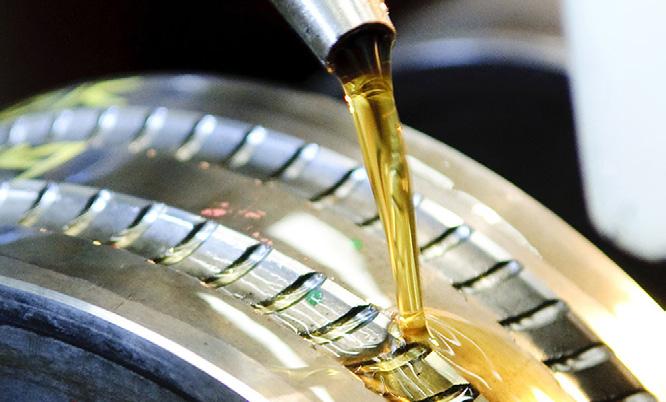

The common linear use of industrial oil, in which it is used in its application until it degrades and then is discarded and replaced, for most of the current oil waste handling does not meet current industrial needs or environmental aspirations. To this end, it is vital to employ circular recovery and the reuse of industrial oil. SKF is leading this change through its RecondOil solution that allows customers to not only avoid supply chain problems, but also reduce costs and diminish their environmental impact.
There is no doubt that oil is a critical asset for all industries. However, if it is not handled properly, oil can become contaminated, which is one of the main causes of premature equipment failure. Consequently, proper oil maintenance is key to optimizing operations and ensuring their continuity. However, oil remains a very expensive commodity and generates large amounts of CO2 during its extraction, refining, blending, transportation and use.
Since the linear use of oil is unsustainable and inefficient, different solutions have been developed to avoid oil contamination, but no conventional method has been known to remove all the small particles that degrade oil over time. For this reason, SKF’s successful Double Separation Technology (DST) has become a game changer in the industry by capturing and separating particles and removing nano-sized impurities, thus allowing the oil to maintain its original properties.
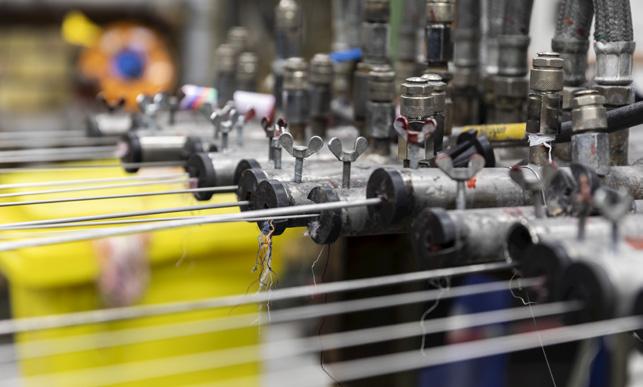
“In contrast to conventional filtering technologies, DST allows continuous regeneration of the same lubrication oil, without stripping it of the additives that provide the characteristics that your machines and production processes require. In fact, with DST, we can regenerate the oil to higher levels of cleanliness than completely new oil. As a result, in some processes, DST-treated, ultra-clean oil provides higher performance than new, off-the-shelf virgin oil,” SKF explained.
SKF’s DST has been extensively tested under real operating conditions and has achieved a particular nanoparticle reduction between 90 and 99 percent. Furthermore, it has been proved that the combination of DST with SKF highperformance oil can result in an almost infinite oil life.
In addition, SKF oils are high-quality oils optimized for DST regeneration. With SKF oils, SKF can do both reconditioning and re-additivation of an oil, which is an essential condition for achieving circularity. Regenerated oil enables one-off oil purchases without replacement and waste of oil. But also, thanks to constantly clean oil, a dramatic increase in industrial process reliability and performance.
Additionally, oil costs are significantly reduced because instead of purchasing equipment and oil based on a traditional model, contracts rely on the performance of operations against relevant parameters like productivity, downtime and energy usage.
The DST process can be implemented in any operation since it can be adapted to the existing oil circulation system or in independent units. In the circulation system, the Integrated DST system works as a complement to the existing filter. The flow filter solution will continue to work as usual while the DST system will regenerate the oil. This allows clean oil to be
Read the complete article More about this company
constantly circulated, improving performance and quality, without the need for oil changes or disposal.
Another solution of the DST are the standalone DST systems, not connected to an existing circulation system. For when the oil has reached the highest point of acceptable degradation and contamination, it will be shipped to the DST plant for batch regeneration. All SKF’s solutions are highly customizable to meet customer needs, specific problems and ensure the high performance, regeneration and circular use of oil.
The future of key industries, such as metallurgical, mining and manufacturing, lies in the circular use of oil and since SKF has a unique product in the market, it will continue to be among the leaders in the segment. “The simplicity of the solution provided by SKF and the benefits of this technology will keep SKF at the top of the segment. SKF has developed different business models to provide oil as a service (OaaS) for a reliable and continuous operation,” said Pascal Verhoie, Head of Sales & Application Development at SKF RecondOil.
The company told MBN it is working on both integrated and the standalone systems to fully commercialize its technology. Furthermore, SKF is developing downsized versions of both systems as well as the SKF range of industrial oil.
It is important to highlight that the newest member in the RecondOil family, launched to the market in April this year, is RecondOil Box, combining the benefits of Double Separation Technology with the compactness and flexibility of SKF’s high performing offline filter technology. The company wanted to achieve the same levels of nanoparticle filtration as with RecondOil’s large-scale DST systems (the integrated and standalone systems)– but on a fraction of the scale. With this solution, it can target a much wider range of customers and applications. SKF will also continue to develop its own oils, as an essential of achieving truly circular use of oil.

Today, the world faces many pressing environmental challenges, including climate change, resource scarcity and pollution. To contribute to a better, cleaner and sustainable future, bearing and seal manufacturer SKF has decided to accelerate its green trajectory and achieve net-zero emissions by 2030.
“We are calling for innovative change on an unprecedented scale and speed. Net-zero emissions is an ambitious goal and we are approaching this task as we always do: with determination, competence and skills. Problem-solving is what we do best. We are committed to this change. Driving the transformation of the future to a more sustainable future is something we actually do and not just talk about,” said Rickard Gustafson, CEO of SKF.
The company has emphasized that industries change the way they work and operate but more importantly, a shift in culture is required to start taking meaningful action. SKF firmly believes the path to sustainability is an obligation for stakeholders, in addition to ensuring good conditions for future generations.
SKF’s new environmental strategy aims for net-zero greenhouse gas emissions at all operations worldwide by 2030. Moreover, the company expects to generate 100% of its energy from renewable sources — it currently generates 40%.
SKF also aims to have a supply chain with net-zero emissions by 2050. As steel is the most carbon-intensive segment in its supply chain, the company is working with suppliers to drive that change. The SteelZero and ResponsibleSteel initiatives have been launched with other steel industry players to promote and accelerate green steel production.
As part of SKF’s commitment to sustainability, a factory in Jinana, China, was inaugurated in 2012 using the company’s geothermal system, saving 40% on heating and cooling each year compared to carbon solutions. As a result, more than 200 tons of carbon dioxide emissions have been reduced.
In Cassino, Italy, a company is switching from traditional fossil products to SKF´s RecondOil, significantly reducing its carbon footprint and allowing oil to be recycled. SKF previously explained to Mexico Business News that the common linear use of industrial oil, used in its application until it degrades and is discarded and replaced, for oil waste handling does not meet current industrial needs or environmental aspirations. To this end, it is vital to employ circular recovery and the reuse of industrial oil. SKF is leading this change through its RecondOil solution that allows customers to not only avoid supply chain problems but also reduce costs and diminish environmental impact.
Along with this solution, the company developed Double Separation Technology (DST), which has become a turning

point in the industry that captures and separates particles and removes nanometer-sized impurities, thus allowing the oil to maintain its original properties.
“In contrast to conventional filtering technologies, DST allows continuous regeneration of the same lubrication oil, without stripping it of the additives that provide the characteristics that machines and production processes require. In fact, with DST, we can regenerate the oil to higher levels of cleanliness than completely new oil. As a result, in some processes, DSTtreated, ultra-clean oil provides higher performance than new, off-the-shelf virgin oil,” SKF explained.
SKF’s DST has been extensively tested under real operating conditions and has achieved a particular nanoparticle reduction between 90 and 99 percent. Furthermore, it has been proved that the combination of DST with SKF highperformance oil can result in an almost infinite oil life.
Another example of the company’s green efforts is SKF’s installation of the world’s most powerful tidal turbine in the Orkney Islands, Scotland. The Orbital 02 solution generates electricity that can either be fed straight into the grid or converted into green hydrogen.
In addition, the company stressed that one of the pillars of its ecological objectives is the pursuit of circularity that takes advantage of used products.
Read the complete article More about this topic
The company’s remanufacturing service, ReManufactura, returns the product to its original state or extends its useful life. Some of the advantages are reducing the use of natural resources, increasing sustainability practices and reducing equipment costs and lead time. In addition, CO2 emissions are reduced by up to 90% compared to new bearings.
SKF, a Swedish and seal manufacturing company, has inaugurated a new facility in Monterrey, Mexico, a greenfield factory investment totaling US$70 million that is aimed at strengthening its electric and commercial vehicle markets.
“Building on over 100 years of presence in Mexico, it is fantastic to see our new factory now being inaugurated. Investing in engineering and manufacturing capabilities in the strategically located Monterrey will make us stronger and more flexible and increase our competitiveness in the Americas,” said Rickard Gustafson, SKF president and CEO.
The facility, located in the municipality of Guadalupe, Nuevo Leon, aims to support SKF’s strategic development in the Americas and meet customer EV requirements.
“These investments further strengthen our offers within the fast-growing and strategically important electric driveline, both for passenger and commercial vehicles, as well as our delivery and regional capabilities in North America. This will reinforce our position as a global, leading supplier to the electric and commercial vehicle markets,” said Kerstin Enochsson, president Automotive.
SKF’s Monterrey facility, with an area of 46,000 square meters, is expected to produce 20 million bearings in 2024 and generate 1,200 new jobs. In addition, deep-groove ball bearings (DGBB) for North American car manufacturers will be developed and manufactured, as well as tapered roller bearings (TRB) for industrial customers, as well as for those in the agricultural sector and in commercial vehicle applications, reported the company.
“Regionalization is an important part of our strategy, and this factory will create a strong regional base for development and manufacturing, and further strengthen our value chain in North America. By being closer to both existing and new customers, we will be able to serve them even better,” said John Schmidt, the company’s Americas president.
Today, the world faces many pressing environmental challenges, including climate change, resource scarcity and pollution. To contribute to a better, cleaner and sustainable future, SKF has also decided to accelerate its green trajectory and achieve net-zero emissions by 2030.
The company has emphasized that over time, industries change in the manner they work and operate, but more importantly, a shift in culture is required to start taking meaningful action. SKF has said it firmly believes the path to sustainability is an obligation for stakeholders, in addition to ensuring good conditions for future generations.
SKF’s new environmental strategy aims for net-zero greenhouse gas emissions at all operations worldwide.
Moreover, the company expects to generate 100% of its energy from renewable sources — it currently generates 40%.
The company also aims to have a supply chain with net-zero emissions by 2050. As steel is the most carbon-intensive segment in its supply chain, the company is working with suppliers to drive that change. The SteelZero and ResponsibleSteel initiatives have been launched with other steel industry players to promote and accelerate green steel production.
